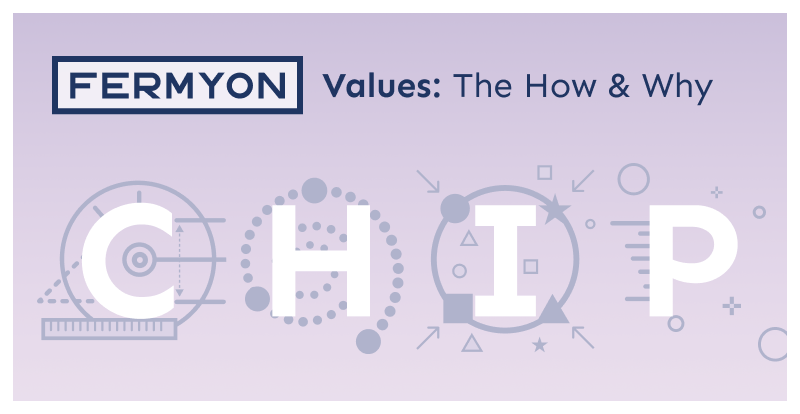Fermyon's Values: The How and Why
 Matt Butcher
Matt Butcher
values
aristotle

One of the first efforts we undertook when starting Fermyon was setting for ourselves a core set of values. Values function for us as a critical component of company culture. We want our values to be meaningful virtues that we genuinely aspire to enact. This post talks about how we decided on our values, why we picked the ones we did, and how we use our values in day-to-day life.
What Are Values?
When we talk about values at Fermyon, we have in mind a specific set of attitudes that we want to embody. My background is in philosophy, so forgive me in advance for drawing on a philosopher. Aristotle once wrote a book to his son about how to live an ethical life (the book is called Nichomachean Ethics). In this book, he introduced a system of moral thought called virtue ethics.
Aristotle’s ethics takes a different shape than the other ethical systems we are familiar with. To Aristotle, ethics isn’t so much a question of how your actions impact others, but in how you shape yourself into an excellent person. To that end, Aristotle talks about virtues. A virtue is an attitude or character trait that is desirable and that you seek to perfect.
Our view of company values is that they ought to function like Aristotle’s virtues: We aspire to embody our values. For that reason, all of our values are about attitudes (as opposed to actions).
Before continuing, there is one major point of Aristotle’s theory worth mentioning. Aristotle did not believe that any given virtue should be maximized. That is, were I to have the virtue of generosity, I have not perfected that virtue when I give away everything I own. Aristotle would consider that foolish (as would most of us). Instead, it’s perfected when I know when to give, to whom to give, and how much to give. And the process of acquiring this knowledge is lengthy. It’s not automatic, and it’s not based on a quick and easy formula. We kept this nuance in mind when picking our values as well.
Choosing Values
In most of the places I’ve worked, values were top-down. That is, the executive team merely informed the rest of us what our corporate values would be. I don’t know if that is the norm, but that is what I experienced.
With Fermyon, we decided to do things differently. We created a board at stickies.io and each person on the team had the opportunity to add as many potential values as they desired. We started with over forty candidates.
Next, we all got together on a video call (Fermyon is entirely distributed; we don’t have an office). One person was appointed to manage the stickies board. We discussed the cards and grouped them into similar themes. By the end of the meeting we had some outliers, but most grouped conveniently into six or seven categories.

There were a few virtues that we felt were true enough that they would just be platitudes if we adopted them. “Trust” and “authenticity” are a few examples. If the company is not built on trust and authenticity, then why even bother? We didn’t feel like they were things that we should aspire to, but things that just had to be true as a foundation. So we didn’t use those.
Instead, we focused on the ones that would stretch us. Ones that are not “trivially true.” We settled on four:
- Inclusivity
- Humility
- Curiosity
- Passion
One person on the team noticed that a small amount of re-arranging gave us a nice easy-to-remember acronym: CHIP. If you were to hang around in a conversation at Fermyon, you’d hear us call these our “chip values.”
What We Do With Our Values
Choosing values is only useful if they make a meaningful difference. They should function in the background as a way to set expectations. But they should also function in the foreground as a vehicle for aspiring to do better (and also as a way of noticing people when they excel).
We’re not experts at this, and we have plenty of room to get better, but these are some of the ways in which we employ our values explicitly.
Make Them Public
First, we published our values statement. On our Values page, we explain what each of the values means and how we try to accomplish it. Earlier, I mentioned Aristotle’s “doctrine of the mean” that the point of a virtue isn’t to push it to its extreme, but to learn how to correctly employ that value. So when we explain “Curiosity” in our values document, we talk about correct employment of the value:
Curiosity is a good example of a value that, if taken to either extreme, can be harmful. Lack of curiosity leads to complacency and hubris. But too much curiosity can prevent us from ever achieving our goals. There is a time and place to shelve curiosity in the name of getting things done.
We also seek to work our values into job postings. There, we pay particular attention to our value of Inclusivity.
Make Them Prominent Internally
In addition to having them on Fermyon.com, our internal site also talks about them. In fact, the summary of our values is at the top of the internal landing page of the Fermyon Hub. We have silly animals attached to each. “Humble” is a mouse. “Inclusive” is a group of meerkats.
But putting them into practice requires more than text and pictures on a few web pages.
We Use Them In Interviews
I can say with certainty that every person who interviews at Fermyon will gain exposure to our values. Interviewers talk about “culture fit” as one of the primary targets for finding out if a candidate will fill a role at a company. We like to focus more specifically on our values because they both tell others who we aspire to be, and ask others if they are willing to aspire toward the same.
Slack Bot
On our internal site, we have a form that one can fill out to thank another team member for helping, or for calling out how another person lived one or more of our values. Optionally, one can send this anonymously. Whenever someone submits this form, a notice is sent to our #goodattitude slack channel.
I wouldn’t say that we use this form every day. But we do use it. And having been on the receiving end, it certainly feels great to have a peer call out something I did that was meaningful.
Working Values Into Our Conversations
One area where we are trying to improve is in referencing values in meetings. When we got together at our first offsite a few weeks ago, it was surprising to me how easily this just happened. But for some reason, it feels harder in our Zoom calls.
Perhaps part of the reason is that none of us wants to feel less-than-sincere when we reference our values. And working them into a conversation just for the sake of mentioning them does feel insincere. As we learn and develop as a company, though, we hope to figure out a good and natural way to use our values as part of our everyday conversations.
Conclusion
We can’t honestly say that we’ve mastered our values yet. But we can say that our values are certainly a genuine part of company culture here at Fermyon. I’ve seen them used in GitHub comments (“it doesn’t sound Humble to state things this way”), in planning, in one-on-one conversations, and elsewhere. And we will get better at doing so as we grow.
Perhaps, though, the most important motivation for making values a part of our day-to-day is found in our hopes for the future. When you are a small team, it is easy enough to stay unified. In many ways, this sort of thing happens implicitly. But as a company grows, it is more important for attitudes and expectations to be made explicit so that we all understand what should motivate us and who we seek to be as a company.
We hope that by making our values explicit and central, we have sewn the seeds that will blossom as the company continues to grow.